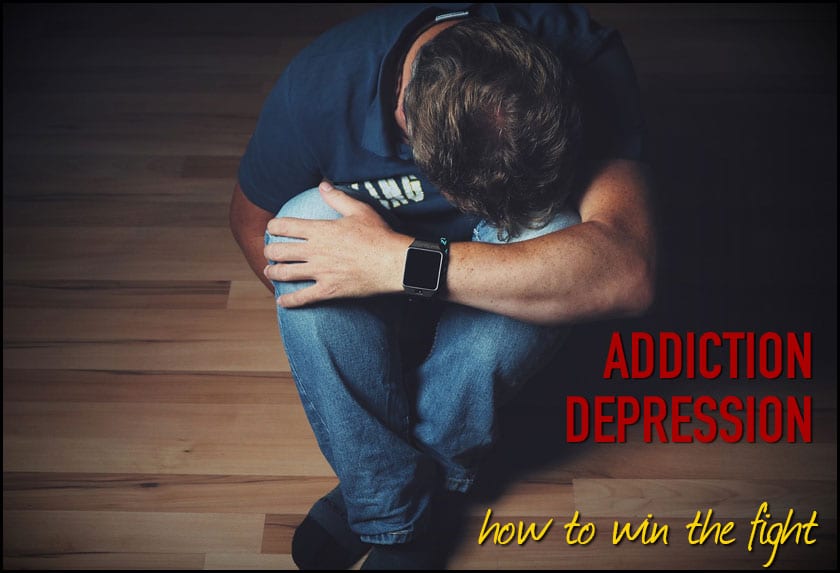Many addicts in America today also suffer from major depressive disorders. Battling depression and addiction can seem like an insurmountable task – how can you know if what you’re feeling is a result of your addiction or caused by your depression? What happens if you suddenly feel depressed during your recovery?
Let’s take a look at what exactly depression is, how it relates to your addiction, and what you can do to cope with depression on the road to recovery.
What Is Depression?
Depression, or clinical depression, is a mood disorder where you feel sad and depressed for an extended period of time. Depression is different from normal sadness (like grief from the death of a loved one) in that it doesn’t pass over a normal length of time.
Symptoms of Depression
The symptoms of depression can vary widely from person to person. However, most people who suffer from depression usually report feeling:
- Consistently sad or lonely
- A complete lack of energy
- Feeling hopeless
- Acute changes in appetite or sleeping patterns
- Loss of interest in activities
- Thoughts of death or suicide
The Link Between Depression and Addiction
The debate rages on in the addiction recovery community about what comes first: depression or addiction. One camp firmly believes that depression comes after addiction, citing experiences where an addict develops depression as a result of the loss they suffer due to their addiction. However, there is strong evidence to suggest that alcohol and drug abuse can be a symptom of depression that is already present.
Regardless of the origins of depression, many sufferers will turn to drugs and alcohol to cope with their depression symptoms. Rather than seek out treatment from a mental health professional, they will self-medicate their symptoms. The euphoria produced by alcohol and drugs provides temporary relief from depression symptoms, but once the substance has left their body, the symptoms return and often feel worse than they did before.
The temporary relief can lead to being trapped in a vicious cycle of stronger depression symptoms that need to be medicated with more quantities of drugs and alcohol. In this cycle, addiction develops.
If you already take medication for your depression and you begin to abuse substances, those substances can also negate the effects of your medication – which can increase your symptoms and even put you at a higher risk of suicide.
How Can You Battle Depression in Recovery?
The most important thing to look for when attempting to treat both your depression and your addiction is to create a treatment plan that addresses both and helps you untangle the two so that you can find yourself in stable recovery that has adequate support.
Here are a couple of other tips that will help you battle depression in recovery:
Learn Your Triggers
A key component to battling depression while you’re in recovery is to learn what sort of people, places, and things trigger your urges to drink to do drugs. When you’re dealing with depression, it may be a certain pattern of thinking, or perhaps a place where certain traumatic events have happened in the past. By understanding how those triggers affect your ability to control your urges, you can find ways to work through or avoid them.
Find Better Coping Mechanisms
Alcohol and drug abuse usually begin as a way to cope with your depression symptoms. By attempting to self-medicate, you trap yourself in a cycle of depression and substance abuse. Work with a mental health professional to develop healthier coping skills that allow you to work through those depressive episodes without having to use substances to lessen the worsening feelings.
Speak Up When You’re Struggling
When you’re feeling particularly depressed or you’re having trouble working through the urge, talk with trusted loved ones, mental health professionals, or your addiction counselor. Fighting through the isolation and loneliness you feel by reaching out to people that can support you can help immensely as you’re working through the worst of your symptoms.
Sometimes Medication is the Answer
Certain types of depression can be so severe that therapy alone won’t help you manage it. If you find that therapy by itself isn’t helping you find the relief that you need, consider talking with a psychiatrist about trying medication. There’s no shame in needing a little extra help to find relief from your symptoms. A psychiatrist will listen to your concerns, take stock of your symptoms, and help you find a medication that will work for you.
When Battling Depression, Remember You are Not Alone
As you take the first few steps on the road to addiction recovery, remember that you are never alone in this process. Working with qualified professionals to help you overcome your addiction and get you the help you need to manage your depression can help increase your chances of success in recovery. A reputable rehab staffed with compassionate, professional addiction specialists can help you in every step of this process and get you the relief that you deserve.













